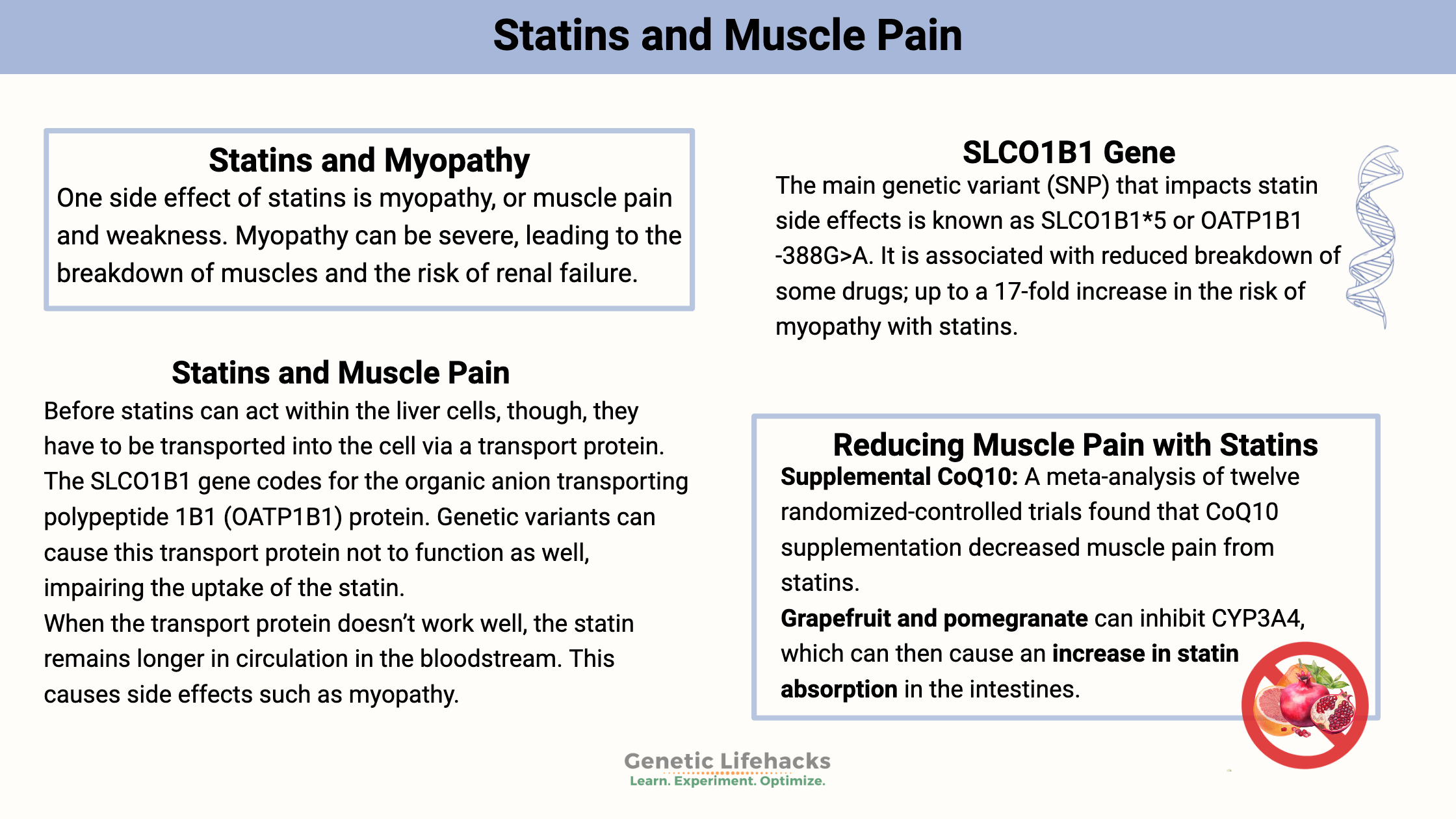Statins are used by tens of millions of people worldwide to lower cholesterol levels.[ref] This type of medication is nearly always top the list of most prescribed in the US, with atorvastatin (a type of statin) as the most prescribed drug in the US as of July 2019.[article]
Genetic variants combine with statin usage to cause muscle pain in some individuals. Learn how to check your genes and what you can do about statin muscle pain. Members will see their genotype report below, plus additional solutions in the Lifehacks section. Join today.
Statins and myopathy
One side effect of statins is myopathy, or muscle pain and weakness. Myopathy can be severe, leading to the breakdown of muscles and the risk of renal failure.
The risk of severe myopathy with statins is small, but milder myotoxicity is found in 7 to 29% of patients. Essentially, this means that less severe, yet still painful, muscle-related symptoms are present in quite a few patients who take statins.[ref]
Why do statins cause muscle pain?
Statins lower cholesterol levels by inhibiting the hydroxymethylglutaryl-coenzyme A reductase enzyme, which is part of the pathway through which the body synthesizes cholesterol. Blocking this enzyme reduces cholesterol synthesis, leading to an increase in LDL receptor expression. More LDL receptors cause more LDL cholesterol to be removed from the bloodstream.
Before statins can act within the liver cells, though, they have to be transported into the cell via a transport protein…
The SLCO1B1 gene codes for the organic anion transporting polypeptide 1B1 (OATP1B1) protein. Genetic variants can cause this transport protein not to function as well, impairing the uptake of the statin.
When the transport protein doesn’t work well, the statin remains longer in circulation in the bloodstream. This causes side effects such as myopathy.[ref]
SLCO1B1 Genotype Report:
The main genetic variant (SNP) that impacts statin side effects is known as SLCO1B1*5 or OATP1B1 -388G>A. You can check your genetic data to see if you carry this variant.
Not a member? Join here. Membership lets you see your data right in each article and also gives you access to the member’s only information in the Lifehacks sections.
Check your genetic data for rs4149056 (23andMe v4, v5; AncestryDNA):
- T/T: typical
- C/T: reduced breakdown of some drugs, a 5-fold increased risk of myopathy with statins[ref]
- C/C: reduced breakdown of some drugs; up to a 17-fold increase in the risk of myopathy with statins[ref][ref][ref][ref]
Members: Your genotype for rs4149056 is —.
Lifehacks for reducing muscle pain with statins:
The rest of this article is for Genetic Lifehacks members only. Consider joining today to see the rest of this article.
Related Articles and Topics:
CYP2C9 Gene: Detoxification of some medications
Have you ever wondered why certain medications don’t work well for you? Genetic variants can change how fast or how slow the medication is broken down in your body.
LDL Cholesterol
Heart disease is the leading cause of death in the US and around the world, and high LDL-cholesterol levels have been linked in many studies to increased heart disease. Standard medical advice on ideal cholesterol levels and cardiovascular disease is often confusing, ever-changing, and sometimes downright contradictory.

